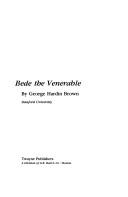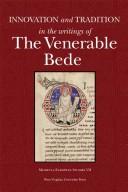| Listing 1 - 10 of 28 | << page >> |
Sort by
|
Book
ISBN: 9780199242771 0199242771 Year: 2019 Publisher: Oxford Clarendon Press
Abstract | Keywords | Export | Availability | Bookmark
 Loading...
Loading...Choose an application
- Reference Manager
- EndNote
- RefWorks (Direct export to RefWorks)
"Although his historical and exegetical works are better known, Bede's small corpus of Latin poetry was widely read and imitated throughout the Middle Ages. Yet in spite of its importance as a keystone in medieval Latin literature, there has not previously been an attempt to collect and edit this corpus of verse in light of all the surviving manuscript evidence. Bede's Latin Poetry is the first edition of his poetic corpus based on all surviving manuscripts. It includes new editions of his two major poems, the 'Verses on Judgement Day' (Versus de die iudicii) and the metrical 'Life of St Cuthbert' (Vita metrica S. Cudbercti), and also includes reconstructions of his two other poetic collections - a book of epigrams and a book of hymns - which were not preserved intact during the Middle Ages and which have had to be assembled from various disparate sources. The editions of all these works are provided with translations and detailed notes, revealing Bede's debts to earlier poets, and illustrating his remarkable skill in understanding the intricacies of Latin verse composition. A series of appendices discuss and print many other poems which have been erroneously attributed to Bede by earlier editors, and include the first edition of a hitherto unknown early draft of his metrical 'Life of St Cuthbert'."--
Latin poetry, Medieval and modern. --- Bede, --- Latin poetry, Medieval and modern --- Latin literature, Medieval and modern --- Cuthbert, --- Baeda Venerabilis, --- Beda, --- Beda Venerabilis, --- Bedanus, --- Venerable Bede, --- Cuthbertus ep. Lindisfarnensis
Book
ISBN: 0813235006 9780813235004 9780813235011 Year: 2022 Publisher: Washington The Catholic University of America Press
Abstract | Keywords | Export | Availability | Bookmark
 Loading...
Loading...Choose an application
- Reference Manager
- EndNote
- RefWorks (Direct export to RefWorks)
Bede (672-735) is known primarily as an historian for his Ecclesiastical History of the English People, but he was also an accomplished pedagogue, hagiographer, and biblical scholar. This book takes a fresh look at this classic Christian thinker, exploring the gamut of Bede's literary corpus. The book investigates key themes, including Bede's understanding of the theological significance of time, his conception of the relationship between the temporal and eternal orders within history, his theological use of rhetoric, his foray into narrative theology, and his spirituality. Bequette's thesis is that Bede was a theologian writing in continuity with the Christian tradition and yet making creative, original contributions to that tradition for the sake of his contemporaries, both in the monastery and in the culture at large.
Bede, --- Baeda Venerabilis, --- Beda, --- Beda Venerabilis, --- Bedanus, --- Venerable Bede, --- 2 BEDA VENERABILIS --- 2 BEDA VENERABILIS Godsdienst. Theologie--BEDA VENERABILIS --- Godsdienst. Theologie--BEDA VENERABILIS --- Bede

ISBN: 0805769404 080573919X Year: 1987 Publisher: Boston Twayne
Abstract | Keywords | Export | Availability | Bookmark
 Loading...
Loading...Choose an application
- Reference Manager
- EndNote
- RefWorks (Direct export to RefWorks)
Anglo-Saxons --- Christian literature, Latin (Medieval and modern) --- Civilization, Anglo-Saxon --- Anglo-Saxon civilization --- Intellectual life --- History and criticism --- Civilization --- Bede, --- Baeda Venerabilis, --- Beda, --- Beda Venerabilis, --- Bedanus, --- Venerable Bede, --- Criticism and interpretation. --- Bede the Venerable
Book
ISBN: 1487514379 9781487514372 9781487501983 1487514387 Year: 2018 Publisher: Toronto
Abstract | Keywords | Export | Availability | Bookmark
 Loading...
Loading...Choose an application
- Reference Manager
- EndNote
- RefWorks (Direct export to RefWorks)
While prayer is generally understood as "communion with God" modern forms of spirituality prefer "communion" that is non-petitionary and wordless. This preference has unduly influenced modern scholarship on historic methods of prayer particularly concerning Anglo-Saxon spirituality. In Compelling God, Stephanie Clark examines the relationship between prayer, gift giving, the self, and community in Anglo-Saxon England. Clark's analysis of the works of Bede, Ælfric, and Alfred utilizes anthropologic and economic theories of exchange in order to reveal the ritualized, gift-giving relationship with God that Anglo-Saxon prayer espoused. Anglo-Saxon prayer therefore should be considered not merely within the usual context of contemplation, rumination, and meditation but also within the context of gift exchange, offering, and sacrifice. Compelling God allows us to see how practices of prayer were at the centre of social connections through which Anglo-Saxons conceptualized a sense of their own personal and communal identity.
English literature --- Christian literature, Latin (Medieval and modern) --- Prayer --- History and criticism. --- Christianity --- History. --- Bede, --- Alfred, --- Aelfric, --- Elfrike, --- Älfrik, --- Aelfrik, --- Alfric, --- Alfricus, --- Elfric, --- Aelfricus, --- Aelfred, --- Alfred the Great, --- Baeda Venerabilis, --- Beda, --- Beda Venerabilis, --- Bedanus, --- Venerable Bede,
Book
ISBN: 9788884502261 8884502268 Year: 2007 Volume: 67 15 Publisher: Firenze Sismel
Abstract | Keywords | Export | Availability | Bookmark
 Loading...
Loading...Choose an application
- Reference Manager
- EndNote
- RefWorks (Direct export to RefWorks)
Bible
---
anno 500-599
---
anno 700-799
---
anno 900-999
---
anno 800-899
---
anno 600-699
---
Beda Venerabilis,
---
Criticism, interpretation, etc.
---
History
---
Study and teaching
---
22.06 <09>
---
091:22
---
Bijbel: exegese--

ISBN: 1933202092 9781933202099 1935978292 Year: 2006 Volume: 7 Publisher: Morgantown West Virginia University Press
Abstract | Keywords | Export | Availability | Bookmark
 Loading...
Loading...Choose an application
- Reference Manager
- EndNote
- RefWorks (Direct export to RefWorks)
Church history --- Eglise --- Histoire --- Bede, --- Northumbria (England : Region) --- Northumbrie (Angleterre : Région) --- Sources --- Histoire religeuse --- Christianity --- Middle Ages, 600-1500 --- Baeda Venerabilis, --- Beda, --- Beda Venerabilis, --- Bedanus, --- Venerable Bede, --- Church history. --- 2 BEDA VENERABILIS --- 2 BEDA VENERABILIS Godsdienst. Theologie--BEDA VENERABILIS --- Godsdienst. Theologie--BEDA VENERABILIS
Book
ISBN: 9048551277 9048524415 9789048524419 9089647147 9789089647146 Year: 2017 Publisher: Amsterdam Amsterdam University Press
Abstract | Keywords | Export | Availability | Bookmark
 Loading...
Loading...Choose an application
- Reference Manager
- EndNote
- RefWorks (Direct export to RefWorks)
The inaugural volume in the 'Sources of Anglo-Saxon Literary Culture' series, which seeks to comprehensively map British literary culture from 500 to 1100 CE. This volume presents four texts, or fascicles, dedicated to the Venerable Bede (d. 735), theologian and author of the 'Historia ecclesiastica gentis Anglorum'. Articles provide a wealth of information on Bede through manuscript evidence, medieval library catalogs, citations, and quotations. Using discussions of source relationships, the entries weigh and consider different interpretations of Bede?s works and suggest possibilities for future research.
English literature --- History and criticism. --- Bede, --- Baeda Venerabilis, --- Beda, --- Beda Venerabilis, --- Bedanus, --- Venerable Bede, --- Criticism and interpretation. --- Christian literature, Latin (Medieval and modern) --- Civilization, Anglo-Saxon --- Anglo-Saxons --- 2 BEDA VENERABILIS --- Anglo-Saxon civilization --- 2 BEDA VENERABILIS Godsdienst. Theologie--BEDA VENERABILIS --- Godsdienst. Theologie--BEDA VENERABILIS --- History and criticism --- Intellectual life --- Civilization --- Civilization, Anglo-Saxon. --- Intellectual life. --- Anglo-Saxon England. --- Bede.
Book
ISBN: 9789462981324 9462981329 9789048530977 9048530970 9048551285 Year: 2018 Publisher: Amsterdam
Abstract | Keywords | Export | Availability | Bookmark
 Loading...
Loading...Choose an application
- Reference Manager
- EndNote
- RefWorks (Direct export to RefWorks)
This newest volume in a long-running work of mapping the sources of Anglo-Saxon literary culture in England from 500 to 1100 CE takes up one of the most important authors of the period, the eighth-century monk-scholar known as the Venerable Bede. Bede is best known as the author of the Historia ecclesiastica gentis Anglorum, which is one of the key sources for our historical and cultural knowledge of the period; this collection covers that and more, drawing on manuscript evidence, medieval library catalogues, Anglo-Latin and Old English versions, citations, quotations, and more, putting Bede and his work in the context of his period.
Christian literature, Latin (Medieval and modern) --- 2 BEDA VENERABILIS --- 2 BEDA VENERABILIS Godsdienst. Theologie--BEDA VENERABILIS --- Godsdienst. Theologie--BEDA VENERABILIS --- History and criticism --- Bede, --- Baeda Venerabilis, --- Beda, --- Beda Venerabilis, --- Bedanus, --- Venerable Bede, --- Criticism and interpretation. --- Civilization, Anglo-Saxon. --- Anglo-Saxons --- Anglo-Saxon civilization --- History and criticism. --- Intellectual life. --- Civilization --- Anglo-Saxon England. --- Bede.
Book
ISBN: 9780521514958 0521514959 9780521730730 0521730732 1139002910 1139801031 9781139002912 Year: 2010 Volume: *139 Publisher: Cambridge Cambridge University Press
Abstract | Keywords | Export | Availability | Bookmark
 Loading...
Loading...Choose an application
- Reference Manager
- EndNote
- RefWorks (Direct export to RefWorks)
"The introduction of Christianity affected the organisation of power. A comparable development is seen most powerfully in the career of Wilfrid: the church had produced a new kind of potentate, an ecclesiastical one, with a status and influence transcending the boundaries of a single kingdom"--Provided by publisher.
Bede the Venerable --- Church history --- Civilization, Anglo-Saxon --- Eglise --- Civilisation anglo-saxonne --- Histoire --- Bede, --- 2 BEDA VENERABILIS --- Godsdienst. Theologie--BEDA VENERABILIS --- Baeda Venerabilis, --- Beda, --- Beda Venerabilis, --- Bedanus, --- Venerable Bede, --- 2 BEDA VENERABILIS Godsdienst. Theologie--BEDA VENERABILIS --- Languages & Literatures --- English --- Greek & Latin Languages & Literatures --- English Literature --- Beda venerabilis --- Bede, - the Venerable, Saint, - 673-735 --- Bède le Vénérable (saint ; 0673?-0735) --- Caractère national anglais --- Prédication --- Biographies --- Influence --- Résidences et lieux familiers --- Moyen âge
Book
ISBN: 9519603042 Year: 1989 Volume: vol 49 Publisher: Helsinki Société néophilologique
Abstract | Keywords | Export | Availability | Bookmark
 Loading...
Loading...Choose an application
- Reference Manager
- EndNote
- RefWorks (Direct export to RefWorks)
802.0-022 --- English language --- -Latin language, Medieval and modern --- -Germanic languages --- Oudengels --- Old English, ca. 450-1100 --- -Passive voice --- Translating --- Bede the Venerable, Saint --- -Language --- Latin language, Medieval and modern --- Passive voice. --- Translating into English. --- Bede, --- Language. --- -Oudengels --- 802.0-022 Oudengels --- -802.0-022 Oudengels --- Germanic languages --- Old English, ca. 450-1100&delete& --- Passive voice --- Translating into English --- Baeda Venerabilis, --- Beda, --- Beda Venerabilis, --- Bedanus, --- Venerable Bede, --- Anglo-saxon (langue) --- Latin (langue) --- Passif --- Traduction en anglo-saxon (l.)
| Listing 1 - 10 of 28 | << page >> |
Sort by
|

 Search
Search Feedback
Feedback About UniCat
About UniCat  Help
Help News
News